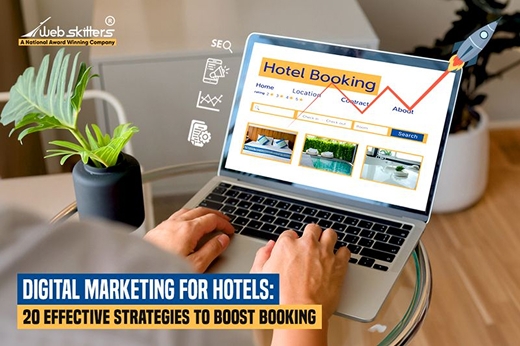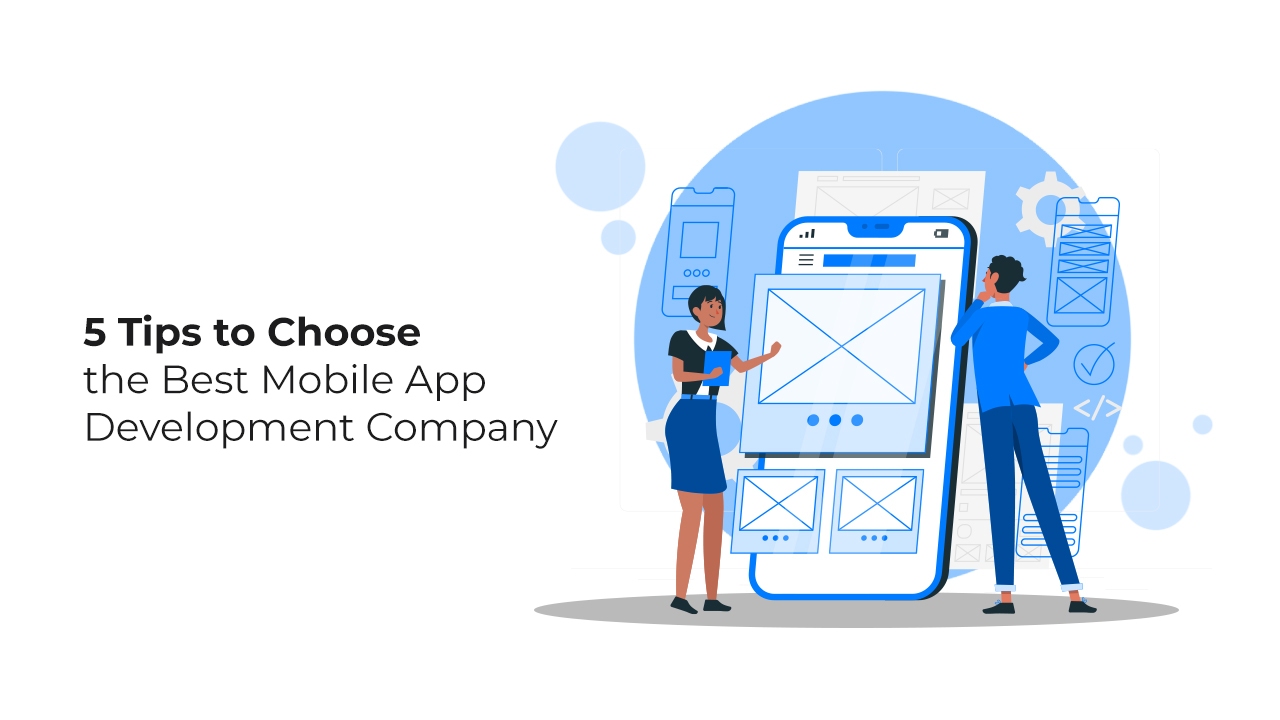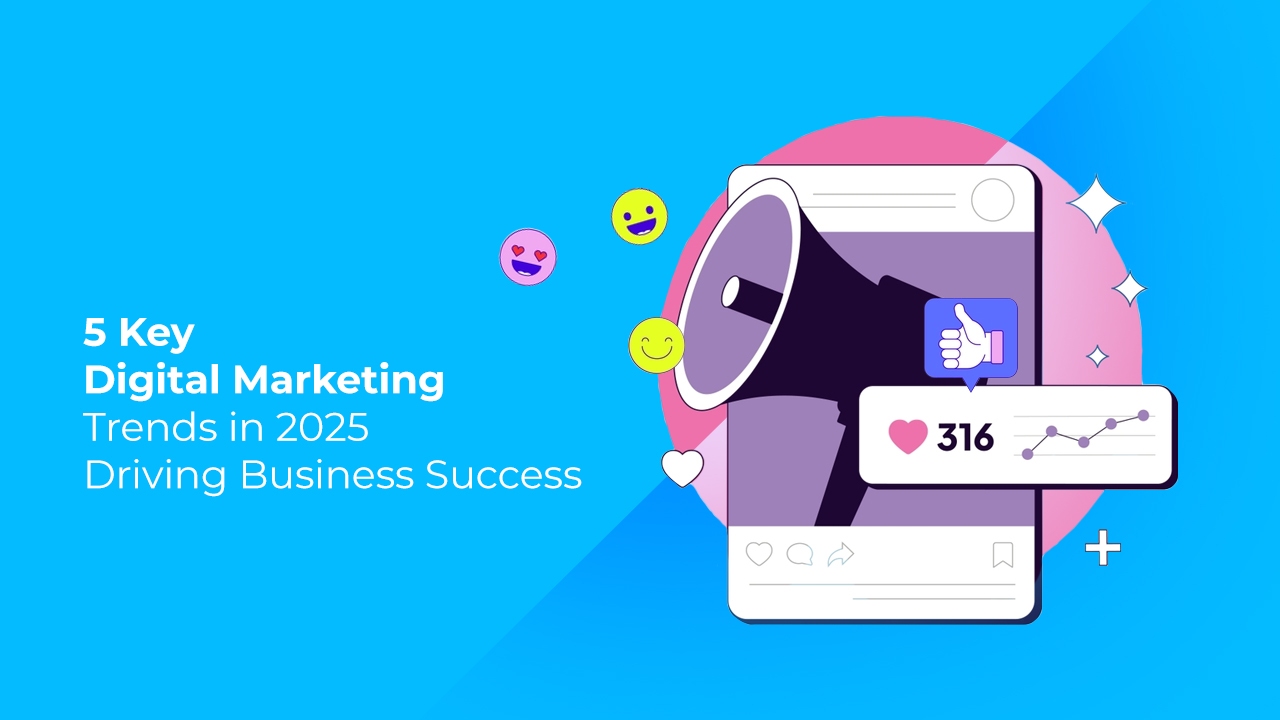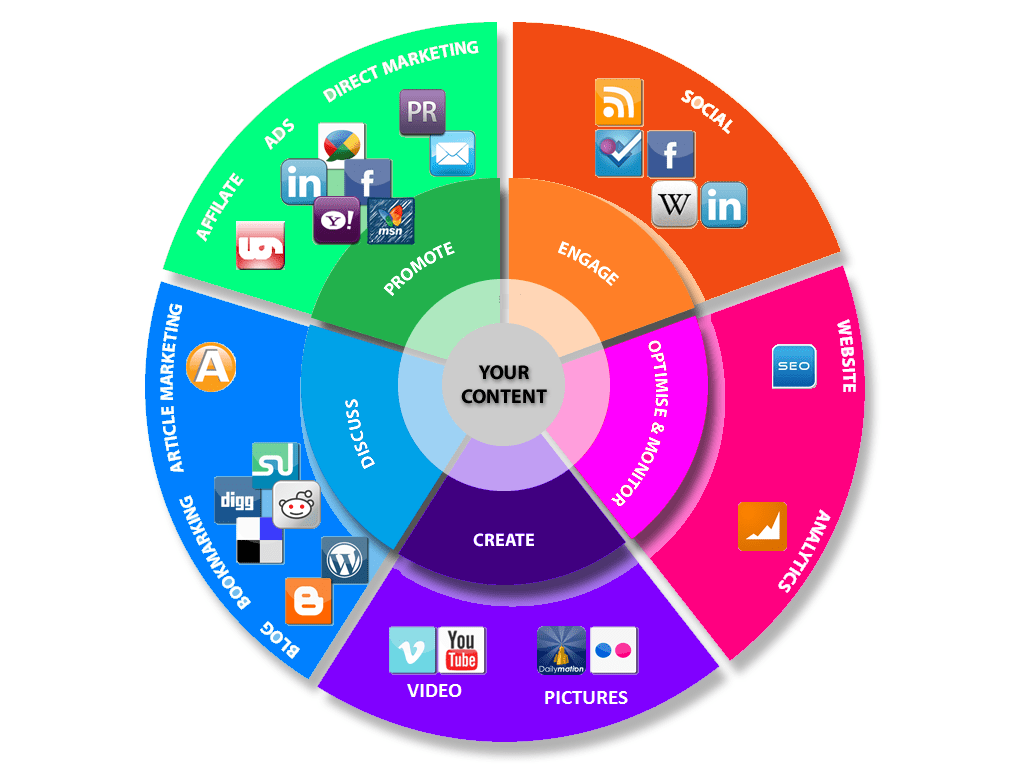
Digital Marketing for Hotels: 20 Effective Strategies to Boost Booking
If you are into the hotel business, you already know what a boon the Internet revolution is. Since the internet has become the epitome of information, people rely on it entirely, even when booking hotels.
For hotel industry tycoons, this translates to more bookings and conversions. However, digital success is not a simple feat. Potent visibility in the search result ensures your target audience finds the business, explores it, and converts.
Here is where a professional digital marketing agency comes in handy! They are skilled in the ideal technique to ensure an optimized web presence for digital growth.
In this detailed read, let us explore the benefits of digital marketing for hotels and how it promotes better conversions and higher ROI.
The Hotel Industry Landscape and Digital Marketing Efforts
The hotel and lodging sector forms the foundation for America’s economic growth and development. It contributes $1.1 trillion annually to the economy and innovates its strategies each year.
Now, the hotel digital marketing segment allows guests to connect digitally with various hotel brands from the comfort of their homes. The strategy utilizes numerous digital channels, such as websites, social media, and emails, to communicate with potential customers, keep them informed, and boost sales.
The ideal tactics and techniques allow affluent property promotion, brand awareness, and positive image development.
The hotel industry is booming with prospects and poised for expansion. Local and international tourists seek authentic brands with impressive hospitality and amenities for lucrative stays. The preference for local stay-cations contributes to the sector’s growth.
Marketing ensures a holistic path to stay ahead of the competition, promote the brand, and turbocharge sales. It has become an indispensable tool for hotels to reach these potential guests and drive bookings.
The concept is straightforward—gone are the days when travelers relied solely on travel agents or brochures to plan their trips. Today, guests have access to a wealth of information at their fingertips. This digital shift has created a highly competitive landscape in which hotels must adapt to survive and thrive.
How does Digital Marketing for Hotels Help Stand Out?
The United States has 343 million internet users, which is growing. The increasing number of internet users and the widespread adoption of smartphones have contributed to many people researching accommodations online.
Here is where digital marketing becomes a powerful tool –
- Enhanced Visibility: Effective digital marketing strategies improve a hotel’s search engine ranking, making it easier for potential guests to find the property. This increased visibility leads to more website traffic and bookings.
- Targeted Marketing: Digital marketing allows hotels to target specific demographics, like business travelers or leisure seekers, with tailored messages. It helps reach the ideal audience and maximize the ROI.
- Reputation Management: Online reviews are crucial in influencing travel decisions. Digital marketing helps monitor and manage online reputation. It entails responding to reviews promptly and addressing any negative feedback.
- Direct Bookings: Digital marketing strategies can help drive more direct bookings through targeted campaigns and website optimization.
- Data-Driven Insights: Digital marketing provides valuable data and analytics to track performance, identify trends, and make data-driven decisions to improve marketing efforts.
Now that you know the benefits, let’s examine the list of digital marketing strategies that will help your business thrive.
-
Content Marketing to Tell a Story
Hotels must stand out and create a lasting impression amidst the competition. One powerful way to achieve this is through narrative-driven content.
Weaving compelling stories about your hotel’s unique features, experiences, and culture creates a detailed understanding among potential guests, which is essential to driving bookings.
Here are some ideas for narrative-driven content that you can incorporate into your marketing strategy:
- Share insights into the hotel’s daily operations, like the process of creating signature cocktails or the inspiration behind the interior design.
- Feature stories from satisfied guests who have had memorable experiences at your hotel. These testimonials are a powerful tool for social proof and help to build trust with potential customers.
- If your hotel has a rich history, share fascinating stories about its past. It adds a unique element to the branding and attracts guests who appreciate heritage and culture.
- Create engaging video tours showcasing the hotel’s amenities, facilities, and atmosphere. Use storytelling techniques to highlight unique features to set the property apart.
- Write blog posts to tell stories about the hotel, the staff, and the local community. It helps position the hotel as a destination offering more than just a place to stay.
Compelling stories create a strong emotional connection with the target audience. It leads to increased brand awareness, trust, and, ultimately, more bookings.
When guests feel a sense of belonging and connection to the hotel, they are likelier to choose your property and recommend it to others. It is the opportune moment of word-of-mouth marketing.
-
Local SEO Optimization for Increased Visibility
Optimizing your online presence for local searches increases the visibility among potential guests in your area and drives more bookings.
When travelers search for “hotels near me” on Google or other search engines, they expect to see relevant results in their vicinity.
Local SEO ensures your hotel appears higher in the search results, making it easier for potential guests to find and choose your property.
A solid local SEO presence can significantly boost your visibility and attract more foot traffic.
Steps to Implement Local SEO –
- Claim and Optimize Your Google My Business Listing
Google My Business is a free tool that allows you to create a business profile and manage your online presence on Google Maps. Make sure to claim your listing, provide accurate and up-to-date information (name, address, phone number, website, hours of operation), and add high-quality hotel photos.
- Optimize Your Website for Local Keywords
Use relevant local keywords in the website, including your homepage, about page, and room descriptions. It helps search engines understand the hotel’s location and match it with local search queries.
- Encourage Online Reviews
Positive online reviews significantly impact the local SEO ranking. Encourage guests to leave reviews on Google, Trip Advisor, and Yelp. Responding to reviews, both positive and negative, improves your online reputation.
- Build Local Citations
Citations mention your hotel’s name, address, and phone number (NAP) across the web. It includes directories, social media profiles, and online review sites. Consistent citations help search engines verify the business information and improve local SEO ranking.
- Partner with Local Businesses
Collaborate with other local businesses, like restaurants, attractions, or tour operators, to cross-promote each other. It helps increase your visibility in the local community and attract more potential guests.
When your hotel appears prominently in local search results, potential guests looking for accommodations nearby are more likely to consider it. This is a low-hanging fruit that significantly contributes to elevated bookings.
-
Virtual Tours for Visual Immersion
Virtual tours offer a compelling way for potential guests to experience the hotel’s rooms and facilities without a physical visit. Utilize 360-degree technology to create immersive virtual tours that allow guests to explore the hotel’s spaces from all angles. It is a powerful tool for increasing booking conversions and providing a realistic and engaging experience. Here is how –
- Virtual tours provide a more immersive experience than traditional photos or videos. It allows potential guests to visualize staying in the hotel. It builds trust and confidence and encourages booking.
- Virtual tours are a powerful tool for engaging potential guests and keeping them interested in your hotel. Guests can learn more about the hotel’s features and amenities and make informed decisions.
-
Mobile-First Optimization
In this mobile-sound era, many travelers use their smartphones to research and book accommodations. Therefore, hotels must ensure optimized websites for mobile devices.
- A mobile-friendly website provides a better user experience, increasing engagement and time spent. It translates to more bookings and higher conversion rates.
- Google and other search engines prioritize mobile-friendly websites in their search results. A well-optimized mobile site improves search engine ranking, making it easier for potential guests to find your hotel.
- A mobile-friendly website is easier to navigate and loads faster, providing a more enjoyable experience for users. It leads to increased customer satisfaction and loyalty.
- Mobile optimization helps capture more direct bookings by providing a seamless booking experience on mobile devices. It reduces the reliance on third-party booking platforms.
Get help from a digital marketing agency when optimizing an online hotel presence. Focus on faster loading time, easy navigation, and smooth booking. Each second increase in load time leads to 9 out of 10 potential clients leaving the space. Additionally, a positive mobile experience increases customer loyalty and repeat business.
-
Email Marketing for Guest Engagement
Email marketing is a powerful tool for nurturing guest relationships. Sending targeted and personalized emails informs the guests about the hotel’s latest offerings, special promotions, and events. It builds loyalty and encourages guests to return for future stays.
- Email marketing allows you to send personalized messages to individual guests based on their preferences and booking history.
- You can use email marketing to promote specific offers and deals to targeted segments of your guest list.
- Email marketing collects feedback from guests about their stay. The information helps improve your hotel’s services and amenities.
Here are some suggestions to utilize email marketing in the ideal way –
- Divide the guest list into segments based on booking history, demographics, and preferences. It allows you to send more targeted and relevant emails.
- Send welcome emails to new guests, introducing them to the hotel and providing valuable information.
- Implement a loyalty program to reward frequent guests. Offer exclusive discounts, upgrades, and other perks to encourage repeat business.
- Use email marketing to promote special events and activities at the hotel, such as live music, spa treatments, or seasonal packages.
- Send a follow-up email after each stay to thank guests for their business and encourage them to return.
When done right, email marketing can be a lucrative avenue to enhance brand growth and conversions. We recommend seeking professional help.
-
Paid Advertising to Target Travelers
Paid advertising, such as Google Ads, helps reach potential guests and drive bookings seamlessly. Strategically targeting travelers with relevant ads increases visibility and attracts more traffic to the website.
Additionally, customized ads can reach specific demographics, interests, and locations. By bidding on relevant keywords, you can ensure the ideal ads reach the potential guests actively searching for hotels in the area.
Here are some best practices revolving around paid advertising –
- Identify the keywords the potential guests are most likely to use when searching for hotels in your area. Use keyword research tools to find relevant keywords and phrases.
- Target the ads to specific geographic locations to reach travelers in the target market. This will help you maximize the ROI.
- Track the performance of the paid ads to measure their effectiveness. Use conversion tracking to monitor the number of clicks and conversions the ads generate.
Paid ads can significantly increase your hotel’s visibility in search engine results pages, making it more likely to be seen by potential guests. It leads to increased website traffic, inquiries, and bookings.
-
Social Media Ad Campaigns
Social media platforms like Facebook and Instagram are significant advertising tools that help hotels reach a broad audience and drive bookings. You can run targeted ad campaigns on these platforms to connect with potential guests interested in the hotel’s offerings. Additionally, social media allows you to interact directly with potential guests through comments, messages, and reviews. It builds relationships and encourages bookings.
Here are professional tactics to utilize social media campaigns –
- Target your ads based on age, gender, location, and interests.
- Identify the target audiences’ interests and create ads that appeal to them. For instance, you could target interested people if your hotel is near a popular tourist attraction.
- Target people interested in hotels, travel, or your specific location. It can help you reach potential guests actively considering booking a hotel.
-
Influencer Collaborations for Wider Reach
While it is a new domain, influencers can be significant allies for hotels and help reach a wider audience through brand awareness.
Partnering with influencers helps in promoting the property and driving bookings –
• Choose influencers who align with the hotel’s brand and target audience. Look for influencers who have a genuine interest in travel and hospitality.
• Offer influencers a valuable experience at your hotel, like a complimentary stay or a special offer. They are more likely to share their positive experiences with their followers.
• Monitor the performance of the influencer partnerships to measure their effectiveness. Track metrics such as website traffic, social media engagement, and bookings.
Influencers can help boost the hotel’s social media following and engagement by sharing your content with their followers. It contributes to direct bookings and recommendations and creates a loyal fan base.
-
Dynamic Pricing Strategies
Dynamic pricing allows hotels to adjust their room rates in real time based on various factors, such as demand, competition, and market trends. It helps maximize revenue regardless of the season.
Dynamic pricing involves using advanced algorithms and data analytics to analyze market conditions and adjust room rates accordingly. It helps hotels –
- To set prices that aligns with demand. Hotels can maximize revenue by charging higher rates during peak periods and lower rates during off-peak periods.
- Fill rooms by offering competitive rates when demand is low. It improves overall occupancy rates.
- Improve profitability by reducing revenue leakage and maximizing revenue per available room.
However, weigh in the essential factors that navigate the dynamic pricing structure –
- Demand: When demand for hotel rooms is high, prices can be increased to capitalize on the scarcity of available rooms. Conversely, when demand is low, prices can be reduced to attract more guests.
- Events: Special events, such as conferences, conventions, or sporting events, significantly impact hotel room demand. Hotels can adjust their pricing accordingly to capitalize on these events.
- Market Trends: Economic conditions, seasonality, and competition can also influence hotel pricing. Hotels can monitor these trends to adjust their pricing strategies accordingly.
A digital marketing agency uses data analytics to analyze market trends, competition, and demand for hotel rooms. The experts can develop dynamic pricing models that help hotels set optimal room rates.
Additionally, the agencies can continuously monitor the performance of dynamic pricing strategies and make adjustments as needed to maximize revenue.
-
Loyalty Programs to Drive Direct Bookings
Loyalty programs are a valuable tool for retaining customers and encouraging further sales. Rewarding guests for their loyalty fosters a sense of belonging and encourages them to book directly with your hotel rather than through third-party agencies.
Loyalty programs help hotels –
- Build Customer Relationships—By offering rewards and benefits, you can strengthen your relationships with guests and create a sense of loyalty and belonging.
- Encourages Repeat Business – Loyalty programs incentivize guests to return to your hotel for future stays, increasing revenue and profitability.
- Reduce Acquisition Costs – Retaining existing customers is generally less expensive than acquiring new ones. Loyalty programs help reduce customer acquisition costs.
Loyalty rewards vary. You can opt for discounted stays, affordable amenities, exclusive offers, and personalized experiences. The success rate of each depends on the target audience and their preferences.
Additional Strategies
In addition to the core strategies discussed above, hotels can implement varied tactics to enhance their digital marketing efforts and drive bookings. These are relatively modern hospitality marketing strategies, and it is ideal to consider professional help –
-
User-Generated Content
Encouraging guests to share their experiences through photos and reviews significantly boosts the hotel’s online presence and reputation. User-generated content (UGC) is often more authentic and trustworthy than traditional marketing materials. It helps improve search engine rankings and attract new guests.
-
Reputation Management
Managing an online reputation is crucial in the digital age. Monitor review platforms like Trip Advisor, Google Reviews, and Yelp and respond promptly to all feedback, both positive and negative. Professionally addressing negative reviews in a timely manner helps mitigate damage and improve the overall reputation.
-
Remarketing Ads
Remarketing ads allow you to target visitors who have previously visited the website but did not complete a booking. You can encourage them to return and complete their reservation by showing them relevant ads on other websites. Remarketing is a highly effective way to convert potential guests into paying customers.
-
Social Proof
Social proof refers to a psychological phenomenon, and people are more likely to purchase or take action when they see others doing the same. Use testimonials, guest stories, and social media engagement metrics to demonstrate the popularity and value of the hotel.
-
Video Marketing
Promotional videos are efficacious tools and showcase the hotel’s unique features and amenities. Create engaging videos highlighting the hotel’s atmosphere, location, and guest experiences. You can share these videos on the website, social media, and through paid advertising campaigns.
-
Met Search Ads
Met search platforms like Google Hotel Ads allow you to bid on hotel bookings directly. By participating in these platforms, you can increase the visibility among potential guests actively searching for hotels.
-
Geofencing Ads
Geofencing technology allows you to target potential guests based on their location. It is particularly effective for reaching travelers near the hotel. For example, you can target people within a certain radius of the property with ads promoting special offers or last-minute deals.
-
AI Chatbots
AI chatbots provide 24/7 assistance to guests, answering their questions and addressing their needs. It improves customer satisfaction and leads to more bookings.
-
Search Engine Marketing (SEM)
SEM involves paid advertising on search engines like Google. Bidding on relevant keywords ensures your hotel appears prominently in search results, increasing your visibility among potential guests.
-
Partnership Marketing
Collaborate with local businesses, like restaurants, attractions, and tour operators, offering joint packages and discounts. It helps attract more guests and cross-promote your businesses.
Bonus Tip:
A/B Testing
No one strategy works effectively. Therefore, be open to experimenting with options and analyze what works best for your hotel business.
These additional strategies for hotel digital marketing enhance the efforts and drive more bookings. It is crucial to continually monitor and evaluate the effectiveness of these tactics and make adjustments for better results.
Increase Hotel Bookings with Digital Marketing
A successful digital marketing strategy understands the target audiences’ needs and preferences and delivers likewise. While marketing is challenging, the ideal strategy helps conquer the objectives and get an appropriate ROI.
The comprehensive list of strategies focusing on digital marketing for hotels helps maximize revenue and develop a result-focused strategy.
Our hotel digital marketing strategy guide is all you need to achieve measurable growth, brand expansion, and scalability.
We recommend connecting with our hotel digital marketing experts. They have a proven track record of working with leading hospitality brands. Our digital marketing for hotels approach has delivered optimum results through years of service and can help your chain grow.

 UI/UX Design
UI/UX Design  Web Development
Web Development  Ecommerce Development
Ecommerce Development  Mobile App Development
Mobile App Development  Game Development
Game Development  Artificial Intelligence
Artificial Intelligence  Internet of Things
Internet of Things  Digital Marketing
Digital Marketing 












